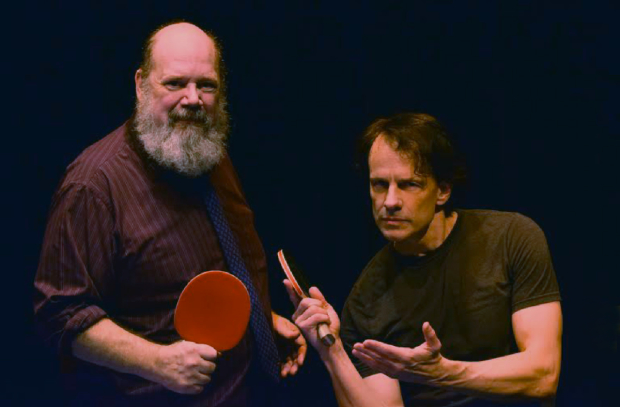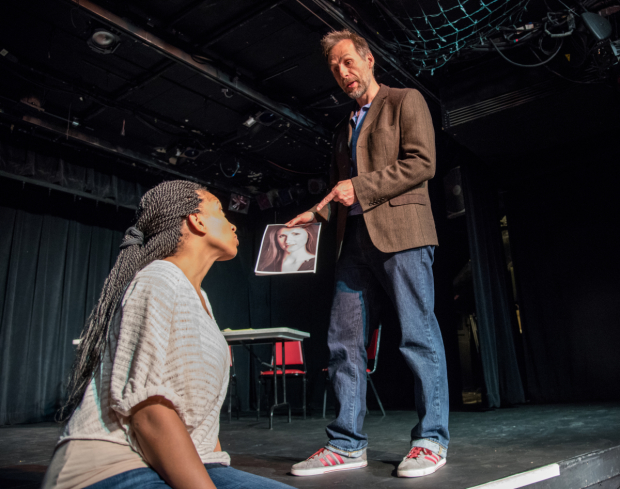FringeNYC 2016: Algorithmism; ChipandGus; Colorblind'd

(© Kent Meister)
By Hayley Levitt
In a generation of Instagram filters, Auto-Tune, and Rock Band, technology has made it increasingly difficult to nail down the already obscure definition of "art" and identify what actually belongs in its coveted ranks. It's a fascinating question, joining artists, philosophers, and scientists in a never-ending conversation that playwright Alex Hersler begins to broach — and will hopefully deepen — as he develops his new play Algorithmism, now running at Abrazo Interno at the Clemente as part of the 2016 New York Fringe Festival.
A one-act two-hander, directed by Richard C. Aven, the play follows a young painter named Paul (given an eccentric-genius vibe by the long-haired Sean Shannon) through his contentious relationship with gallery owner Tom (a paternal yet subtly threatening performance by Terrence Montgomery). Tom discovered Paul as a precocious novice, who, early in his career, created one of the most brilliant works Tom had ever seen. However, after an acclaimed debut at the Whitney Museum burdened him with the pressure of the spotlight, Paul's creative juices stopped flowing — as did Tom's revenue.
Following the lead of a rival gallery owner, Tom decides to give Paul's slot in his upcoming season to an ACI (Artificial Creative Intelligence) — a program that can absorb artistic data and spit out its own original work of "art" at mind-boggling speed. In defense of his own craft (and livelihood), Paul initially rejects machine-made work, calling it void of artistic merit, but soon comes around to the idea when his "collaboration" with an ACI program eases his typically torturous process (unbeknownst to Tom, Paul decides to teach the ACI his body of work and have it do the hard labor of creating his next masterpiece).
As real-life computational creativity grows in sophistication, Hersler picks a timely subject to hash out onstage — arguably the least susceptible artistic forum to technological outsourcing. Yet, as the scenes between Paul and Tom unfold, their debate over the definition of artistic "innovation" circles the same points without moving in any surprising directions: Is art in the eye of the beholder? Is beauty any less valid if it comes from a machine rather than a human? If Hersler continues further down the intricate paths that these questions open up, he could have himself a real work of art.

(© Chris Young)
By Hayley Levitt
Good acting, like good conversation, is a game of Ping-Pong. The New York Fringe Festival's comic two-hander ChipandGus, staged around the periphery of a Ping-Pong table, stretches this metaphor to the nth degree. However, thanks to the perfectly matched Christopher Patrick Mullen (Chip) and John Ahlin (Gus) — the show's talented coauthors, codirectors, and costars — ChipandGus gracefully withstands the tension with thoughtful character development and a barrage of witty dialogue that flows as easily as Ahlin and Mullen's impressive volleys.
Swap out the bowler hats for paddles and the play could pass for a modern homage to Waiting for Godot — though with a little more backstory for our main characters, both of them professors at an unnamed college in upstate New York. The two casual acquaintances meet every third Tuesday for a friendly game of Ping-Pong at a local bar. They take on an Abbott and Costello rapport as the sprightly straight man Chip — a musician of questionable talent — indulges the brilliant buffoon Gus in his intellectual ramblings on everything from Platonic ontology to the proper use of prepositions. Coolly chomping on a piece of gum for the play's full 90 minutes, Mullen gives the impression of a reformed bad boy while his rotund pal portrays an obsessively meticulous and socially anxious man who finds shelter in the facts and figures of life.
Benign conversation to the dulcet tones of ping and pong eventually devolves into a battle royale accompanying intimate personal revelations. For a play so light on plot, the pace of this downhill tumble is a little too creeping. But along the way, Mullen and Ahlin hit a few genuinely poignant notes on love and friendship, and the reasons we engage in them, even though they're as unpredictable and nonsensical as the trajectory of a rogue ball.

(© Keith Winsted)
By David Gordon
"Can't get tix to Hamilton? Come see the second-best show in NYC about nontraditional casting!" So begin the press notes for Kirk White's Colorblind'd at the Players Theatre. However, this glib new drama, about a black college theater professor who decides to cast a white actress as Rosa Parks, owes less to Lin-Manuel Miranda's multiracial Broadway musical about the American founding fathers than it does to a 2015 controversy at Kent State. In that instance, a black director double-cast the role of Martin Luther King Jr. in Katori Hall's The Mountaintop with a white actor and a black actor.
At the center is Eden (Malikha Mallette), a director at Dixie College, who chooses the lily-white Lucy (Jenna Sander, doing her best Southern belle) to play the civil rights pioneer over Dorien (Yanece Cotto), the sole nonwhite student in the department. Only David (James Kloiber), a fellow professor and seemingly Lucy's former lover, realizes that a controversy will likely brew, but no one listens to him.
While the premise and first few scenes are engaging, the inconsistent Colorblind'd quickly flies off the rails, leaving more questions than answers over the course of its 80 minutes. It’s unclear what David's exact role with the production is and why his job is on the line rather than the show’s actual director. And did Lucy and David actually have an affair? By the end, writer White and director Keith Winsted seem to abandon their question of nontraditional casting and simply leave us scratching our heads over plot holes. All in all, Colorblind'd is a disappointingly missed opportunity.












